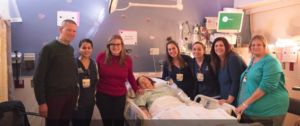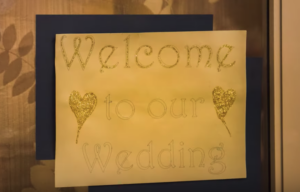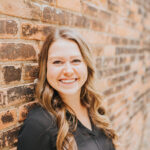Not a normal nursing shift
Courtney Davis, an emergency medicine nurse at Michigan Medicine, immediately got to work after talking to her patient’s family.
Time was of the essence.
But instead of performing tasks common to a nurse, Davis embarked on an urgent quest for decorations and materials to build an arch.
She had just acquired a new title: wedding planner.
The Clark family
Brenda Clark, EdD, was busy in her role as president and chief executive officer of the MBA Research and Curriculum Center in Columbus, Ohio, and would travel back to be with her family, husband, David, and children, Robert, Courtney, Tyler, and Faith, in Muskegon, Mich., on weekends.
After having a lingering cough most of the summer, Brenda’s friend told her she should have it checked out. While she thought it was nothing – just a side effect of being busy – she decided to go to the doctor in September 2019.
“They took an X-ray to see what was going on and there was a large mass on her lung,” David says. “They said it was stage 4 lung cancer.”
The Clark family turned to the University of Michigan Rogel Cancer Center for Brenda’s care and met with Theodore Lawrence, MD/PhD, a professor and chair of the Michigan Medicine Department of Radiation Oncology, and Gregory Kalemkerian, MD, a professor of oncology at Michigan Medicine. It was the first week of October.
“They said it had already begun spreading to her brain and they needed to fit her for a mask for radiation on her head,” David says.
A turn for the worst
The Clark family returned to Ann Arbor the evening of Oct. 10, 2019, for Brenda’s appointment with her oncology care team the next morning.
“We were all staying at a nearby hotel, and at 3 a.m. Brenda started making strange noises,” David says. “At 5 a.m. she became unresponsive and was rushed to Michigan Medicine in an ambulance.”
Brenda was brought to the Massey Family Foundation Emergency Critical Care Center, more commonly called the EC3, at Michigan Medicine.
“There were 20 or more people lining the hallway waiting for us when we arrived, including members of Dr. Kalemkerian’s care team,” David says. “They all went right to work.”
Brenda’s oncology care team had initially hoped they could treat her and get her back to a stable condition to continue with her cancer treatments, David says.
“She just deteriorated so quickly.”
Devising a plan

Michigan Medicine staff joined the Clark family in celebrating Courtney Clark’s wedding. (Image courtesy of Michigan Medicine.)
Courtney Davis arrived to her shift on Friday, Oct. 11, 2019, and was briefed on the patient in the EC3’s room 93: Brenda Clark.
“The Clark family inspired me from the moment I stepped into their room,” Davis says.
“When I came on my night shift, the day team had worked tirelessly to correct the extensive problems that Mrs. Clark was experiencing,” she says. “An emergency department team’s nightmare had become a reality. We couldn’t cure or fix our patient and now it was time to explain that finality to the family.”
Davis, the day care team, and her fellow night care team members spoke with the Clarks about the next phase in Brenda’s care plan and the ultimate goal of making her comfortable.
“The family was rightly and appropriately devastated,” Davis says.
After much of the extended Clark family had left for the day, David pulled Davis aside.
“He told me that his daughter Courtney’s boyfriend, Ben, had asked him just a few weeks ago for the family heirloom ring and he planned to ask Courtney for her hand in marriage,” Davis says.
The proposal was supposed to take place that very weekend on Mackinac Island.
“Then he asked me if they could have the wedding in Mrs. Clark’s room so she could be present for her daughter’s wedding day, and that they would not bother the unit or other patients.”
Davis didn’t hesitate.
“I told him that we could absolutely host his daughter’s wedding and that I would do all in my power to make it as special as possible and they wouldn’t have to worry about a thing,” she says.
Davis immediately went to work enlisting the help of her fellow EC3 nursing staff.
“We made all types of decorations including signs that said ‘Congratulations, Ben and Courtney’ and ‘Just Married,’” Davis says. “We worked to make the room more comfortable and soothing, hanging lights. I positioned the arch they would be married under right in front of Mrs. Clark so she would have the best view in the house.”
Davis wanted Brenda to feel her best, too.
“Mrs. Clark had a test performed earlier in the day that left glue in her hair,” she says. “I washed and brushed her hair so the remnants of her treatment would be less conspicuous.”
She adds, “When my shift drew to a close, I asked another EC3 nurse, Malinda Morrison, if she would take over. I knew she was perfect for the job because she’s compassionate and caring. I knew she would be 100-percent dedicated to carrying on the mission Mr. Clark and I had devised.”
It was time to host a wedding.
The big day
“Courtney and Ben met in the Peace Corps in Africa,” David says. “They both were evacuated in 2014 because of the Ebola outbreak. They both got jobs in Washington, D.C., and have been together since.”
Word spread fast throughout the EC3 that it was Courtney and Ben’s wedding day. Within minutes, several team members donated funds, purchased items, or volunteered their time to make the wedding go off without a hitch.
“I was approached by several staff members of different job families that were all eager to help in any way they could,” Morrison says. “We had people immediately figure out a way to purchase a wedding cake, volunteer their musical talents to play live music during the ceremony, and make arrangements to have a boutonniere, corsage, and bridal flowers delivered.”
Morrison and the Clark daughters did Brenda’s makeup and helped her put on a beautiful dress.
“My favorite part of the preparation was getting Mrs. Clark ready with her daughters and seeing Mr. Clark’s reaction when he first saw her done-up,” Morrison says. “He told her she was beautiful, and there wasn’t a dry eye in the room.”
Courtney and Ben were married in the EC3 that afternoon.
“The ceremony was such a beautiful thing to witness,” Morrison says. “To see a family pull together and make the best of a heart-shattering situation was incredible. There was so much love and appreciation, and I think everyone felt a part of it.”
To ensure Courtney, Ben, and the Clark family would have a way to look back at the special day for years to come, Cecile Hollinshead, an emergency medicine physician assistant, volunteered her photography talents.“I do photography as a hobby and my passion is to capture moments,” Hollinshead says. “It was a beautiful time to be able to merge my two passions: medicine and photography. I felt that I was scheduled to be in the EC3 that day for a reason.”
Joy and sorrow
Certainly no wedding would be complete without a reception. William Meurer, MD, an associate professor of emergency medicine and Brenda’s attending physician, provided a reception dinner for the family.
“Mr. Clark saw me in the back crying,” Meurer says. “It moved me a lot. I had been at the bedside with my grandmother and mother-in-law at the ends of their natural lives and it’s a powerful experience. I’m glad we could make this happen for the Clark family.”
Compassion and empathy are traits many of Brenda’s care team embody.
“I lost my dad to cancer and he was in hospice for months,” Hollinshead says. “I wish he was a part of my siblings’ or my special day. I thought what a special thing to do in what would be such a somber moment for the Clark family.”
Davis agrees, “I empathized and connected with the Clark family because I share the same age and name as their eldest daughter and bride, Courtney. I too am engaged, planning my own wedding. My mom is a breast cancer survivor that I am blessed to still have with me. It was so easy for me to empathize with this family because, in another world, this could have been me, my family and my mom that I was saying goodbye to way too soon.”
A legacy lives on
The next morning, Sunday, Oct. 13, 2019, Brenda Clark passed away at 59 years old.
“Social work gifted us clay mold kits so we could have her handprints with us,” David says.
He’s been working through how to handle the grief of losing his wife.
“I’ve tried to walk into the grief and have been encouraging my children to attend grief programs,” David says. “There are days when I have lapses and I get angry, but I have to be the strong one for my family.”
He takes comfort in knowing Brenda’s legacy will live on through education, one of her passions.
“She had impacted thousands of educators and students through her teaching work,” David says. “That legacy will always continue.”
He’s appreciative of the EC3 staff and the care they provided Brenda and his family.
“They were all so humble and modest in everything they did for us,” David says. “In fact, Ben was previously studying engineering, but after the care shown by the team, he has had a change of heart and has decided to study nursing. I’ll always remember this care team.”
One way he keeps them with him: He wears the cross necklace Morrison had purchased for Brenda from the hospital gift shop.
“I’ve worn it every single day since the funeral,” David says.
Lighting the way

When David Clark returned to Michigan Medicine for a visit, he brought Courtney’s wedding album to share with the team. (Image courtesy of Michigan Medicine.)
In January 2020, David visited the EC3 to thank the staff and give them a gift of his own.
“I brought them a set of string lights for each room in the center,” David says. “Those lights made Brenda’s room feel more comforting.”
Davis, Morrison, and the team were thrilled to visit with David.
“It was very heartwarming to see that Mr. Clark now wears the necklace that I bought for Mrs. Clark to wear for the ceremony,” Morrison says. “Caring for Mrs. Clark and her family that day was a prime example of why I became a nurse in the first place: to make a difference.”
“It was a very difficult time for Mr. Clark and his family, however, I am incredibly proud of our staff who went above and beyond to make this memory for this family which will stay with them, and us, for the rest of our lives,” says Benjamin Bassin, MD, an assistant professor of emergency medicine at Michigan Medicine and the EC3’s director of clinical operations.
Davis agrees, “Seeing Mr. Clark really solidified the impact our team can have on patients and their families.
“We see people on their worst of days and their best of days,” she continues. “ We have the capacity to significantly impact, influence, and change the lives of our patients and their families, and that should never be taken for granted.”
(This story is repurposed from Michigan Medicine’s Michigan Health blog.)






Tom Moffit - 1972
Thank You for sharing this beautiful and heart warming story and for truly being the Leaders & BEST!!!
Reply